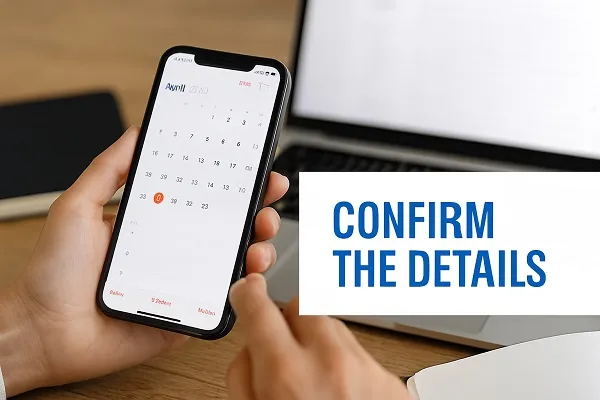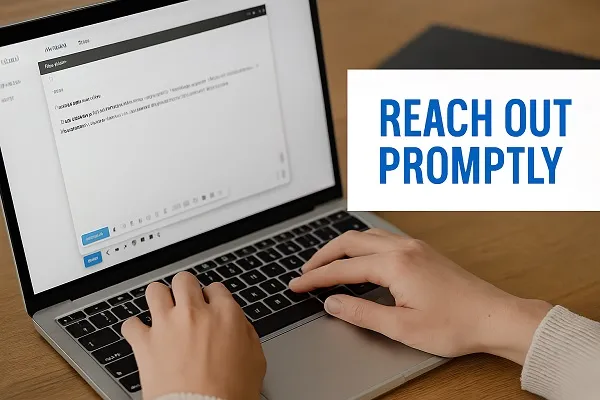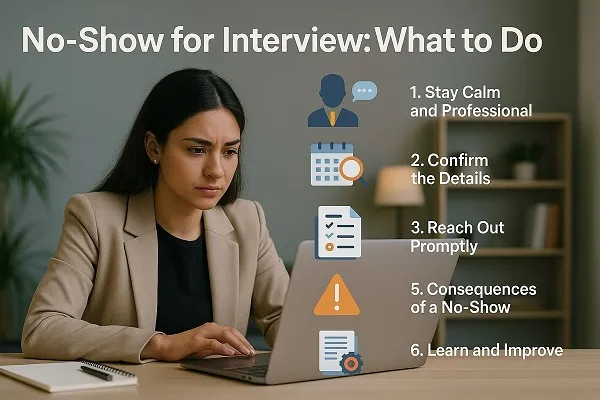An interview no-show — whether you’re the interviewer or the candidate — can be frustrating and disappointing. However, how you handle the situation afterward can leave a lasting impression and even turn a missed opportunity into a new one. Here’s a guide on what to do if a candidate or interviewer doesn’t show up — and why it’s important to do everything possible to avoid it.
1. Stay Calm and Professional

First and foremost, keep your emotions in check. A no-show doesn’t necessarily reflect a lack of respect or professionalism. Emergencies, technical issues, or miscommunications can happen. Give the benefit of the doubt until you have more information.
2. Confirm the Details

Double-check the interview schedule. Verify the date, time, time zone, and platform (e.g., Zoom, in-person, phone). Sometimes, a simple misunderstanding can be the cause.
If you’re the candidate:
- Check your email and messages to see if the interviewer sent any updates or last-minute changes.
If you’re the interviewer:
- Confirm if your scheduling system or calendar had the correct information.
3. Reach Out Promptly (Email Template)

Send a polite email or message shortly after the missed interview:
For candidates:
“Hi [Interviewer Name], I was scheduled for an interview today at [time]. I just wanted to check if there was a misunderstanding or if you would like to reschedule. I am still very interested in the opportunity and happy to accommodate another time that works for you.”
For interviewers:
“Hi [Candidate Name], we missed you at today’s interview scheduled for [time]. I hope everything is okay on your end. Please let me know if you would like to reschedule or if you need any assistance.”
Keep the tone friendly, understanding, and professional.
4. Decide Whether to Reschedule
Depending on the response you receive, decide whether you want to reschedule:
- If it was an honest mistake or emergency: Rescheduling is usually worthwhile.
- If communication is poor or the other party is unresponsive: It may be best to move on.
Reliability is a key indicator of future professionalism.
5. Consequences of a No-Show

Failing to show up for an interview without notice can have serious repercussions, including:
For Candidates:
- Lost Opportunities: Missing an interview could cost you the job — and hurt your chances with the company in the future.
- Damaged Reputation: Word spreads in industries, especially tight-knit ones. Being seen as unreliable can close other doors.
- Reduced Confidence: No-showing without good reason can lead to internal regret and self-doubt.
For Interviewers/Employers:
- Negative Candidate Experience: Candidates who feel disregarded may share their experiences publicly, harming your employer brand.
- Missed Top Talent: A disorganized or missing interviewer can cause highly qualified candidates to walk away.
- Wasted Resources: Recruitment costs time, money, and effort — all wasted if no one shows up.
6. Update Your Records
Document the missed interview, the communication that followed, and any decisions made. This record will be helpful for future reference, especially if the person applies again or if internal reviews occur.
7. Learn and Improve

Use the experience to tighten your processes:
- Send reminder emails or messages the day before or a few hours prior.
- Clarify time zones and platforms.
- Offer a backup contact method in case of technical issues.
Proactively managing these details can minimize future no-shows and create a smoother experience for everyone involved.
Why You Must Do Everything Possible to Prevent a No-Show
Proactively preventing no-shows protects your professional image, saves resources, and keeps opportunities alive. Here’s why you should prioritize avoiding it:
- Demonstrates Respect: Showing up honors the time and effort the other person has invested.
- Builds Professional Trust: Reliability is a cornerstone of strong professional relationships.
- Opens Doors for the Future: Even if the opportunity isn’t perfect, good impressions often lead to future offers, partnerships, or referrals.
- Saves Time and Money: Every scheduled interview costs effort to arrange; avoiding a no-show makes the process smoother and more efficient.
- Reflects on Your Character: Your punctuality and responsibility during the hiring process are often viewed as a reflection of how you’ll perform once hired (or how you value candidates if you’re hiring).
Taking simple precautions, such as sending reminders, confirming schedules, and preparing early can greatly minimize the risk of missing an important meeting.
Content reviewed and published by Tier2Tek Staffing Editorial Team .

